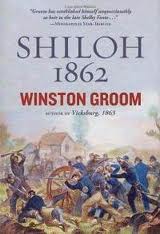Winston Groom. Shiloh, 1862.
Washington, D.C.: National Geographic, 2012.
As reviewed by Ted Odenwald
 The first battle of Manassas/Bull Run in July of 1861 was an omen that the conflict between America’s North and South was going to be much more than a brief spat. The battle of Shiloh in Tennessee the following April proved to be a major awakening for both sides to the fact that the Civil War was going to be devastating to America—united or divided. The 24,000 casualties of this horrific two-day clash accounted for more carnage than combined American losses from the Revolutionary War, the War of 1812, and the Mexican War. “It was as if at Shiloh [the two sides] had unleashed some giant, murderous thing that was going to drench the country in blood….”
The first battle of Manassas/Bull Run in July of 1861 was an omen that the conflict between America’s North and South was going to be much more than a brief spat. The battle of Shiloh in Tennessee the following April proved to be a major awakening for both sides to the fact that the Civil War was going to be devastating to America—united or divided. The 24,000 casualties of this horrific two-day clash accounted for more carnage than combined American losses from the Revolutionary War, the War of 1812, and the Mexican War. “It was as if at Shiloh [the two sides] had unleashed some giant, murderous thing that was going to drench the country in blood….”
Historian/novelist Winston Groom, relying heavily on primary sources, particularly diaries of both warriors and civilians, details events before, during, and after the battle. General Grant, fresh from victories at Fort Henry on the Tennessee River and Fort Donelson on the Cumberland River, had encamped near Shiloh Church, employing nearby Pittsburg Landing for resupplies of ordinance, food, and reinforcements. Inexplicably, he had set up minimal security details with virtually no fortifications for defense, using local areas for drilling his relatively untested units in tactical maneuvers. Not even the knowledge that his Confederate counterpart, General Albert Sidney Johnston, was encamped just twenty miles away seemed to alert Grant to potential danger. Johnston, knowing that all of Grant’s forces had not yet been assembled, surmised that a quick, surprise attack would likely catch the Union forces off guard and unprepared. The shock and the ferocity of the first day’s attack drove Grant’s army into a panicky defensive position, with their backs to the Tennessee River. Johnston’s aggressiveness worked against him as he fearlessly rallied frightened troops, but recklessly put himself in harm’s way; he was mortally wounded. His successor, General P.T. Beauregard, hesitated because of the approaching evening, and thus failed to exploit the advantage that Johnston’s surge had gained. The next morning, Grant, with fresh reinforcements, reversed the field, driving the Confederates back towards their original positions.
While narrating events, Groom focuses briefly upon figures who were involved in the battle. Generals Grant and Sherman had recently emerged from periods of professional disgrace. Under the hostile eye of General Halleck, the commander of the Department of the West, Grant was living down the reputation of being slovenly, frequently drunk, and insubordinate. Sherman had been sidelined with what was treated as a mental breakdown, though his critics called him crazy and cowardly; his “sin” had been insisting that a much larger army would be needed to win the war.
Johnston was eulogized by Confederate President, Jefferson Davis as being a pillar of his army. Beauregard was rebuked and basically blackballed by Davis for failing to press his advantage at Shiloh, and for later abandoning a key railroad hub for the western arena.
Groom frequently speaks through the words of gifted diarists. Ambrose Bierce, who would later become a popular novelist, served as a Union lieutenant; Henry Stanley, who would later become a famous explorer, was a Confederate enlisted man. Ann Wallace, the wife of Union general W.H. L Wallace, recorded having come to the area to visit her husband, only to find herself on the edge of the battlefield, worrying about not only her husband, but also about several members of her family who were involved in this engagement. She also dealt heroically with the news of her husband’s fatal injuries by ministering to wounded soldiers in a field hospital. Josie Underwood’s diary reveals “the terrible and conflicting civilian drama spawned by the war.” A resident of nearby Bowling Green, Kentucky, she had many friends and relations in Tennessee, most of whom sided with the South, while she and her father were unionists. She learned the horrors of social ostracism and of knowing that a loved one would be fighting on the “enemy” side.
The detailed accounts of various stages of the wildly shifting battle, combined with the first-hand accounts of several gifted writers, makes for a deeply felt depiction of the first of several major bloodbaths in this war. A mixture of inexperienced, barely disciplined troops, major blunders of judgment on the part of leaders, and adherence to outdated military tactics in the face of newly developed weapons made this no more than a pyrrhic victory for Grant and a frustratingly elusive glimpse of victory for Beauregard.
 Ted Odenwald and his wife, Shirley have lived in Oakland for 42 years. He taught HS English at Glen Rock High School for all of those years plus one more. Now he is enjoying time spent with his family, singing in the North Jersey Chorus and quenching his wanderlust. Ted is also the Worship Leader at the Ramapo Valley Baptist Church in Oakland.
Ted Odenwald and his wife, Shirley have lived in Oakland for 42 years. He taught HS English at Glen Rock High School for all of those years plus one more. Now he is enjoying time spent with his family, singing in the North Jersey Chorus and quenching his wanderlust. Ted is also the Worship Leader at the Ramapo Valley Baptist Church in Oakland.
